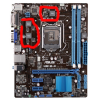My new motherboard is Asus H61 chipset which supports only CPU up to 77W, according to Asus' specification. However, my CPU's TDP is 95W, according to intel's specification. Their socket match so they are now working, running windows and functioning. However, I am worried if the CPU would fry the motherboard because it generates more power than the motherboard can handle?
Should I undervolt my CPU? Will it reduce the temperature and make my motherboard or other hardware less likely to fail soon?
I do not mind having speed or performance reduced because I am a light user - I do not gaming
Should I undervolt my CPU? Will it reduce the temperature and make my motherboard or other hardware less likely to fail soon?
I do not mind having speed or performance reduced because I am a light user - I do not gaming

